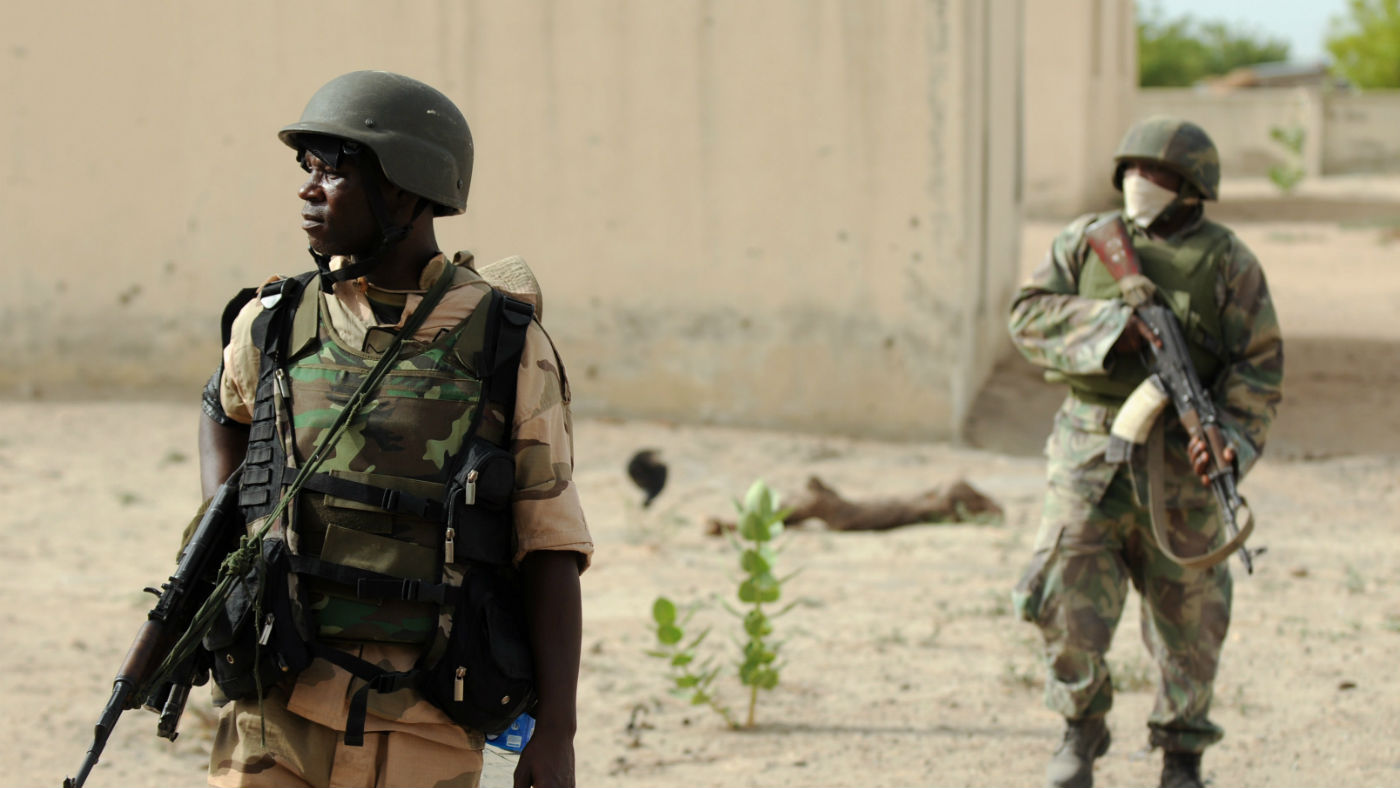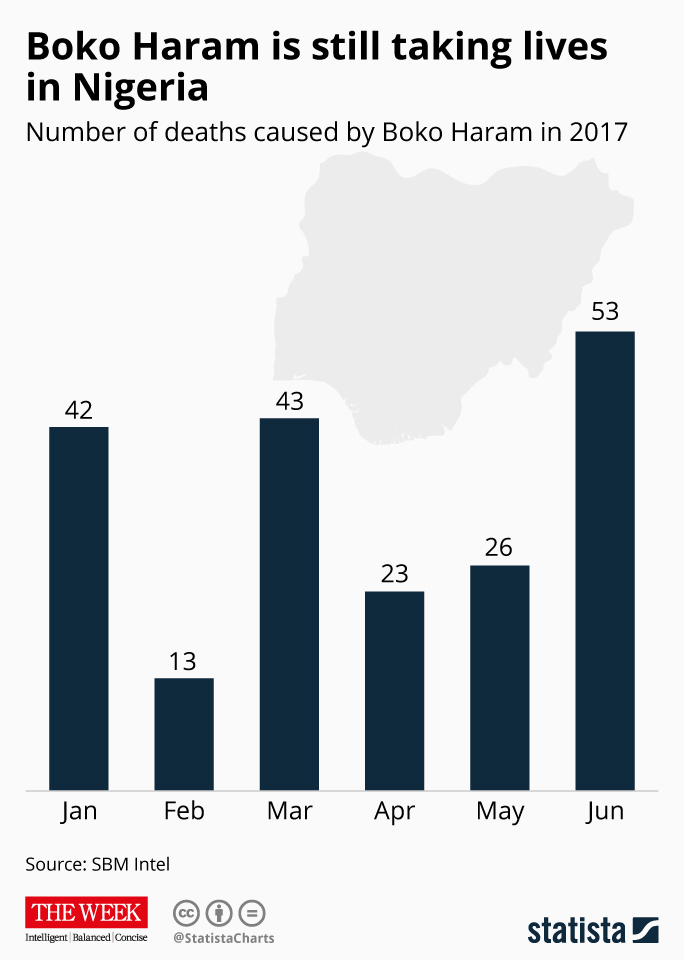Fact Check: Has Boko Haram been defeated by Nigeria?
Military leaders claim victory over the militants – but they've said that before

A free daily email with the biggest news stories of the day – and the best features from TheWeek.com
You are now subscribed
Your newsletter sign-up was successful
Nigerian troops say they have beaten the Boko Haram militants who have been waging a long and bloody insurgency aimed at establishing an Islamic caliphate in the north of the country.
Officials have been accused in the past of exaggerating the scale of success against the Islamist terror group, however. So is this another premature claim? The Week looks at the facts.
What is Boko Haram and what has it done?
The Week
Escape your echo chamber. Get the facts behind the news, plus analysis from multiple perspectives.

Sign up for The Week's Free Newsletters
From our morning news briefing to a weekly Good News Newsletter, get the best of The Week delivered directly to your inbox.
From our morning news briefing to a weekly Good News Newsletter, get the best of The Week delivered directly to your inbox.
Boko Haram – which roughly translates as “Western education is forbidden” – was founded in 2002 in the city of Maiduguri. After initially allying with Al-Qaeda, it switched allegiance to Islamic State in 2015.
The insurgency began in earnest in 2009 and has been concentrated in north-eastern Nigeria, but attacks have also extended into neighbouring Cameroon and Chad.
Nearly 20,000 people have died in the conflict, according to data compiled by the Council on Foreign Relations.
The group's worst atrocities include the massacre of an entire town, the abduction of more than 200 schoolgirls in Chibok, and a series of bombings at schools, churches and markets across the country.
A free daily email with the biggest news stories of the day – and the best features from TheWeek.com

What does the military say about the battle?
"I can confidently state that we have succeeded in defeating the Boko Haram terrorists," Lieutenant General Tukur Yusuf Buratai told PM News Nigeria in early July.
"We have chased away the terrorists and recaptured all the hitherto held territories, rescued over 20,000 [people] abducted by them including some of the Chibok schoolgirls," he added.
But in a BBC HardTalk interview, Buratai conceded that the militant group has not been completely eliminated.
What about the government?
President Muhammadu Buhari made a similar statement in 2015, telling the BBC that Nigeria had "technically won the war" against Boko Haram as it could no longer mount "conventional attacks" against security forces or population centres.
However, local lawmakers have accused Buhari's government of "deceiving Nigerians with stories of defeat of [the] insurgents",
Nigeria's Daily Post reports.
"If indeed Boko Haram was already defeated, where are those suicide bombings and attacks coming from?" Governor Ayodele Fayose, of Ekiti State, said in January.
What are the facts?
Nigeria witnessed a general downward trend in violence during 2016, according to the Armed Conflict Location & Event Data Project (ACLED), which tracks civil unrest across Africa.
The battle against Boko Haram "turned decisively in the state's favour" from February, when government forces killed or captured a large number of militants. This paved the way for them to win back significant amounts of territory from the insurgent group in March and April, it reports.
This was done with the help of a strong regional coalition – made up of troops from Nigeria, Cameroon, Chad and Niger – as well as a crackdown on corrupt military officials.
"This trend would continue throughout the year, albeit at lower levels, and culminate in the important strategic and symbolic victory of clearing Boko Haram out of the Sambisa Forest, their primary stronghold, in mid-December 2016," ACLED says.
But the group has shown signs of resurgence in recent months, launching a spate of deadly bombings in the north-east, including an attack on the University of Maiduguri.
By the end of June 2017, Boko Haram had carried out 43 attacks, resulting in 200 civilian deaths, according to reports from SBM Intel, an Africa-focused market intelligence firm.
"As it has lost territory, Boko Haram [has] changed strategy, and has refocused on its ability to carry out suicide bombings and quick raids on rural communities," says the report, published this month.
The alarming use of children in suicide bombings has also surged this year, UNICEF has warned.
Who is right?
Boko Haram has lost much of the territory it claimed during the early days of its insurgency. However, the recent wave of suicide bombings suggest the fight is far from over.
Infographic by www.statista.com for TheWeek.co.uk
-
 Ex-South Korean leader gets life sentence for insurrection
Ex-South Korean leader gets life sentence for insurrectionSpeed Read South Korean President Yoon Suk Yeol was sentenced to life in prison over his declaration of martial law in 2024
-
 At least 8 dead in California’s deadliest avalanche
At least 8 dead in California’s deadliest avalancheSpeed Read The avalanche near Lake Tahoe was the deadliest in modern California history and the worst in the US since 1981
-
 Political cartoons for February 19
Political cartoons for February 19Cartoons Thursday’s political cartoons include a suspicious package, a piece of the cake, and more
-
 Epstein files topple law CEO, roil UK government
Epstein files topple law CEO, roil UK governmentSpeed Read Peter Mandelson, Britain’s former ambassador to the US, is caught up in the scandal
-
 Iran and US prepare to meet after skirmishes
Iran and US prepare to meet after skirmishesSpeed Read The incident comes amid heightened tensions in the Middle East
-
 Israel retrieves final hostage’s body from Gaza
Israel retrieves final hostage’s body from GazaSpeed Read The 24-year-old police officer was killed during the initial Hamas attack
-
 China’s Xi targets top general in growing purge
China’s Xi targets top general in growing purgeSpeed Read Zhang Youxia is being investigated over ‘grave violations’ of the law
-
 Panama and Canada are negotiating over a crucial copper mine
Panama and Canada are negotiating over a crucial copper mineIn the Spotlight Panama is set to make a final decision on the mine this summer
-
 Why Greenland’s natural resources are nearly impossible to mine
Why Greenland’s natural resources are nearly impossible to mineThe Explainer The country’s natural landscape makes the task extremely difficult
-
 Iran cuts internet as protests escalate
Iran cuts internet as protests escalateSpeed Reada Government buildings across the country have been set on fire
-
 US nabs ‘shadow’ tanker claimed by Russia
US nabs ‘shadow’ tanker claimed by RussiaSpeed Read The ship was one of two vessels seized by the US military